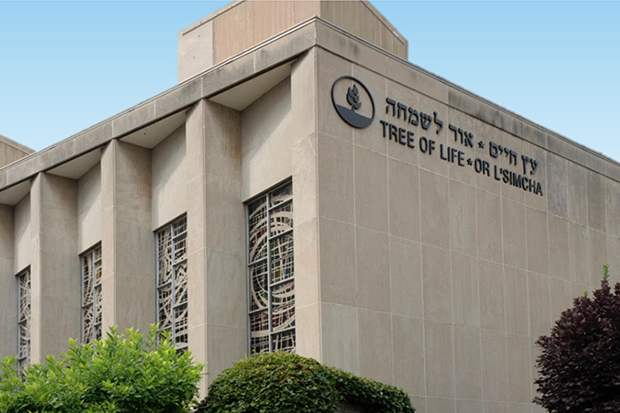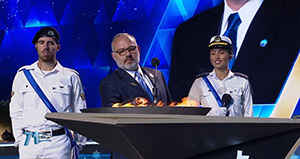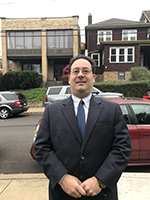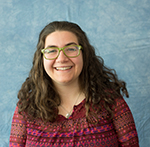Responding to the Tree of Life massacre
Over the past year, alums have played key leadership roles in guiding Pittsburgh's Jewish community through the process of mourning and healing.

Sam Schachner ’93 was on his way to synagogue for Shabbat services with his son in preparation for his upcoming bar mitzvah. They were running 15 minutes late, which likely saved their lives.
Jeff Finkelstein, MA ’93, was relaxing at home, still jet-lagged from a trip to Israel, when he got a call from work telling him what had happened. He raced to the site and watched in horror as a SWAT team stormed the building in search of the shooter.
Tova Perlman ’18 was eating a Shabbat lunch in Brooklyn when another guest told her the news, unaware that Perlman’s father, a rabbi, was leading services at the temple when the gunman arrived.
On October 27, 2018, Schachner, Finkelstein and Perlman’s lives changed forever. They all had strong ties to the Tree of Life synagogue in Pittsburgh, the site of the deadliest attack on American Jews in U.S. history. Eleven people were killed when an anti-Semitic fanatic entered the building and opened fire.
On October 27, 2018, Schachner, Finkelstein and Perlman’s lives changed forever. The year since the massacre has been a time of mourning and healing. Schachner and Finkelstein are both leaders in the Pittsburgh Jewish community, Schachner as the Tree of Life’s president and Finkelstein as chief executive officer of the Jewish Federation of Greater Pittsburgh.
“When I see someone in a grocery store, I try not to ask so much how people are doing because I don't think there's a good answer to that question,” Finkelstein said. “But just to be there and to say hello and give each other a hug — it's really a wonderful thing.”
Perlman moved to Pittsburgh in 10th grade when her father, Jonathan, got a job as rabbi of the New Light Congregation, which at the time rented space in Tree of Life’s building. When the shooting began, he survived by hiding with several congregants in a supply closet.
New Light lost three members in the shooting, all of whom Perlman knew well.
“I think the shooting introduced the feeling of unsteadiness or instability or insecurity in my life,” she said. “It’s a traumatic event in my life.”
Jeff Finkelstein, MA '93
Within hours after the alleged shooter’s arrest, Finkelstein and his colleagues at the Jewish Federation of Greater Pittsburgh were meeting with other agencies to coordinate a plan of action. A few floors below, families had gathered, hoping to learn the fate of their loved ones.

Finkelstein at Israel's national remembrance day for fallen soldiers in 2019.
Over the last year, he’s focused on boosting security at the city’s synagogues, schools and other Jewish organizations and teaching people how to respond to an attack. It’s not what he’d prefer to be doing, but, he said, “it’s just the world we live in.”
He also played a role in establishing A Resiliency Center, known as the 10.27 Healing Partnership, which offers mental health services to anyone — Jew or gentile — in need of counseling due to the shooting. It serves as both a place for individuals to get therapy and for the larger community to gather to work through trauma.
If anything good can be said to come of the massacre, Finkelstein said, it’s been getting the chance to know the victims’ families. “They're incredible people,” he said. “Their strength is inspiring.”
Sam Schachner ’93
Schachner grew up in Squirrel Hill, the tight-knit, heavily Jewish neighborhood where the massacre happened. He found at Brandeis a much more diverse community than he expected. “I had the wonderful opportunity to not only be around Jews,” he said, “but also had a number of friends and roommates from other faiths and backgrounds. I gained support and friendship from a wide variety of people.”

Sam Schachner
Schachner, a practicing psychologist, said there were small acts of kindness too, ranging from an African American church’s donation of a steel sculpture to people offering gifts of teddy bears and homemade meals. Members of other faiths also attended Tree of Life’s Shabbat services, which Schachner said provided “a sense of family, love and support, so that we knew we were not alone.”
The synagogue has also received visits from members of the African Methodist Episcopal Church in Charleston, South Carolina, where a racist gunman killed nine African Americans in 2015.
“They were able to help us learn how to cope, to work with our congregation and the community to attempt to heal,” said Schachner. “It's a very unfortunate club that we have joined and yet those in the club very much want to make sure that there’s support for each other.”
He added, “We know that we’re not alone.”
Tova Perlman ’18
In the wake of such a seemingly random, out-of-the-blue attack, Perlman felt a sense of helplessness. “I wanted to regain a sense of control,” she said. “My way of doing that was to organize and give back.”

Tova Perlman
In May, she asked Modern Loss, a community that offers resources and an online forum for dealing with grief, to hold an event in Brooklyn. Many of her friends attended and talked about losing a loved one or relative. Perlman opened up about her experience, too. She said her friends, many of whom were there, were nervous about talking to her.
“They didn't know how to comfort me or what to say,” she said. “But it's not like they’re reminding me of something that I've forgotten. I told them, ‘Don't be scared to bring it up.’”
This summer, after mass shootings in Dayton, Ohio, and El Paso, Texas, Perlman sent letters to residents there offering her condolences as part of a letter-writing campaign. In one she addressed to an elementary school, she wrote about how confusing it can be to grieve amidst all the news outlets and reporters covering the tragedy.
“You feel it’s your community, you know all these people personally, but for the media, it’s about politics or an issue like gun control,” Perlman said. “The public will see a picture of a girl crying and hugging her mom, but to you, it’s like, I know her and I know her friends. It's very different.”
Perlman goes back to Pittsburgh every few months. She notices that some members of her family and the Jewish community refer to what happened as “October 27.” She usually calls it, “the shooting.” “I think people are too traumatized to refer to it with violent language and instead use the date,” Perlman said.





